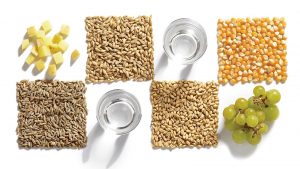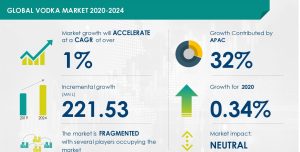From its humble medieval origins as a medicinal agent, vodka has conquered the world. In 2012, tipplers downed 1.17 billion gallons of the distilled alcoholic beverage, making it the world's most popular spirit. But what is vodka made from?
To produce vodka, you must first ferment any foodstuff that contains sugar or starch, then distill the product to increase its alcohol content. (Fermentation means feeding sugar to yeast, so that the yeast can produce alcohol.) Today, most vodka is made from fermented grains such as sorghum, corn, rice, rye or wheat, though you can also use potatoes, fruits or even just sugar.

Related projects:- Vodka Related Project Reports & Profiles
Process of Making Vodka from Grain
There are many ways to produce vodka. The most popular vodka is from grains, like rye, wheat and corn. Other options include using potatoes, beets or molasses. If using rye or wheat, first the grain must be mixed into water and then heated to create a wort. The heat breaks down the starches into fermentable sugars, which escape the grain and move into the water. Next, the wort is drained and the ensuing liquid becomes the ferment for vodka, also known as the wash. For potatoes the procedure is the same, just mash the potatoes to facilitate the heating and conversion of the starches.
Following the fermentation process, the wash is put into the still and is run once through a reflux and at least twice through a pot still. As mentioned above, the more bubble plates closed off in the reflux still, the higher the proof and the less the flavor. Also, some people might choose to filter the vodka through charcoal, which adds a slightly Smokey flavor but also gives vodka its crisp taste it is known for. Finally, the spirit will need to be cut. Since the spirit is distilled at a high proof (usually around 190 proof, or 95% alcohol) it needs to be cut down to your preferred taste. Most vodkas are cut to 80 proof, or 40% alcohol. Vodkas tend to be clear and are not aged in barrels. Naturally, there are exceptions and you will find a few distillers abroad who will flavor and age their vodkas (which resembles more a brandy), but this is not an option in the US.
Related projects:- Potato Processing, Potato Based Products, Potato Chips & Wafers, Potato Granules, Potato Wine, Alcohol, Vodka, Sticks, French Fries, Potato Specialties, Dehydrated, Frozen Potato Products, Potato Starch, Potato Powder, Flakes & Pellets, Liquid Glucose
The Future Growth of the Industry
The global alcohol consumption has been increasing continuously, especially in developed regions of North America and Europe. Though the consumption share of beer is higher, the wine and spirit segment has been witnessing faster growth in terms of consumption. The revenue sales of spirits in the global stage increased by 43% over a five-year timeline, i.e. between 2007 and 2011. Owing to changing trend of consumption of spirits, a rise in demand for high purity alcohols, especially from the manufacturers' side, has been witnessed. Grain Neutral spirits have alcoholic strength of more than 95.0% v/v min. Grain neutral spirits consist of various kinds of grain alcohol, which is produced through repeated fermentation and distillation of wheat, rye and other such grains.
Related books:- Alcohol Based Industries, Alcoholic And Non Alcoholic Beverages ,Fruit Juices, Whisky, Beer, Rum ,Wine And Sugarcane Bye Products

The global wine and spirits market is being driven by a rise in consumption rate of gin (+ 3.7%), tequila (+5.2%) and whiskey (1.7%). On the other hand, Grain Neutral spirits are used on a large scale as raw material alcohol in the production of spirits, such as vodka, gin, etc. Grain neutral spirits help to maintain the flavor of alcohol, having at least 95.0% v/v min alcoholic strength. Hence, the rise in consumption of wines and spirits will help drive the demand for grain neutral spirits.
Related videos:- Beverages, Fruit Juice, Alcohol, Wine, Whisky, Mineral Water, Packaged Drinking Water, Beer, Energy Drinks, Hard and Soft Drinks, Alcoholic and Non-Al
Conclusion
The project report covers all the major aspects of analyzing the market, confirming the availability of various necessities such as plant & machinery, raw materials to forecasting the financial requirements. India and from worldwide the engineers, project consultant & industrial consultancy firms have benefited from the project report to analyze the market.
Noo_Art21
Tags:-
#DetailedProjectReport #businessconsultant #BusinessPlan
#feasibilityReport #NPCS #industrialproject #entrepreneurindia #startupbusiness #BusinessIdeas #StartupBusinessIdeas #BusinessOpportunity #Vodka #VodkaBusiness #VodkaProduction #VodkaIndustry #VodkaMarket #BeveragesMarket #AlcoholicDrinks